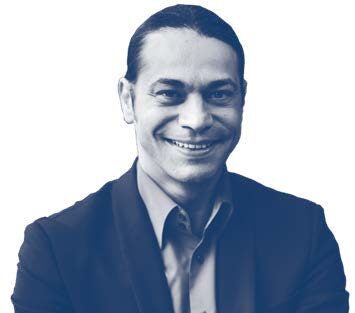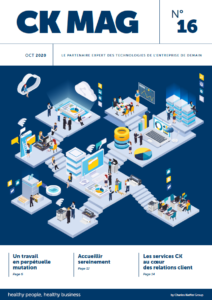Abdu Gnaba is an anthropologist. As the founder of SocioLab, he examines company development from the perspective of beliefs, myths and imagination. In his view, what makes two economic stakeholders different from each other is no longer just purely technical criteria, but also the values they assert, the identity they express and their social commitment. As he likes to say, the future belongs to missionaries rather than mercenaries or functionaries.

″ People with a mission feel that they are working for something larger than themselves. Their satisfaction is not limited to quantitative goals, but also leads them towards qualitative criteria, key success factors that ensure both collective and individual progress.
″
What has the health crisis shown us?
Abdu Gnaba : Without a doubt, the qualitative value of human connections. During the lockdown and this current period of social distancing, the thing we are missing the most is spending time with other people, seeing their faces, watching their expressions – all of that non-verbal communication and sharing of emotions. Humans are social beings and the pandemic has reminded us how much we are connected with each other, for worse (contagion) and for better (cooperation).
Will how we work change for the long-term?
Abdu Gnaba : The crisis has merely sped up changes that were already taking place. The days of buying a product or service for its functionality alone are over. We differentiate between things not just on technical criteria, but also in terms of goods’ material and immaterial value through what they represent to the community of purchasers and consumers. For example, the shock absorption system used in Adidas shoes is scientifically proven to be more efficient than that used by Nike, but the latter inspires greater desire and thus sells more products. Similarly, a brand now sells not just tangible items but also a view of the world, values, and imagination, and even ways of doing business have significantly changed. In the modern digital era, you could say that the core of a business relationship is now the ‘relationship’ itself. As Warren Buffett jokingly put it, the difference between two $20 bills is the cashier. The human side comes to the fore.
What does this mean in practice?
Abdu Gnaba : The creation of expertise specific to the company, the expression of a culture that makes it a unique entity. Whether designers, suppliers, partners or customers, more than ever we all want to feel part of the same tribe. Today, we are no longer trading just products, but also a way of working, a method of production and a desire to serve that reflect a larger undertaking than just immediate commercial interests. For example, social responsibility and consideration of human relationships are essential pieces of data.
What does this mean in practice?
Abdu Gnaba : The creation of expertise specific to the company, the expression of a culture that makes it a unique entity. Whether designers, suppliers, partners or customers, more than ever we all want to feel part of the same tribe. Today, we are no longer trading just products, but also a way of working, a method of production and a desire to serve that reflect a larger undertaking than just immediate commercial interests. For example, social responsibility and consideration of human relationships are essential pieces of data.
How can a company define its expertise?
Abdu Gnaba : By showcasing the markers of its identity. As a social anthropologist, I take the same approach as my biological anthropology colleagues who unearth the traces of ancient civilisations. Like any human group, a company is based on a founding myth and an original reason for being, which we might call the ‘initial reasons for its creation’. This foundation then gives rise to values – not abstract categories, but rather ways of behaving, a mindset regarding business relationships and life within the company. An organisation’s dynamic is based on these two initial factors that enable it to set out its vision and growth system. Founding myth, values, vision: three steps to defining a company’s expertise and ensuring its consistency.
So if I understand you correctly, the health crisis has highlighted our need for connection, and this need for connection is determining how we work because it reminds us that suppliers and customers share more than just financial interests?
Abdu Gnaba : Precisely. They share a culture. What makes a company unique is how it forms a connection, and its point of difference is human beings. And since human relationships represent the core of all forms of exchange, we can see that the companies coping best with the crisis are those that make humans the focal point of their strategy. And to draw on the teachings of a philosopher whose name often inspires fear, a healthy economy is one based on Kant’s categorical imperative: ‘Act in such a way that you always treat humanity, whether in your own person or in the person of any other, never simply as a means, but always at the same time as an end.’ Replace ‘humanity’ with ‘customers and employees’, and you get what we have found to be the case in the highest-performing companies.
What have you learned from your corporate experience?
Abdu Gnaba : That we are no longer differentiating by product, but rather by relationships, by the expertise that shines through even more in difficult moments. The difference between Fnac and Darty is no longer just about products, but also the relationships that each entity maintains with its customers. Surprisingly, the hunt for a qualitative relationship is even more important for B2B than it is for B2C. A company that understands its culture can share it, and unite its internal and external ecosystems with its own particular spirit.
Discover the entire CK Mag n°16 in digital version













